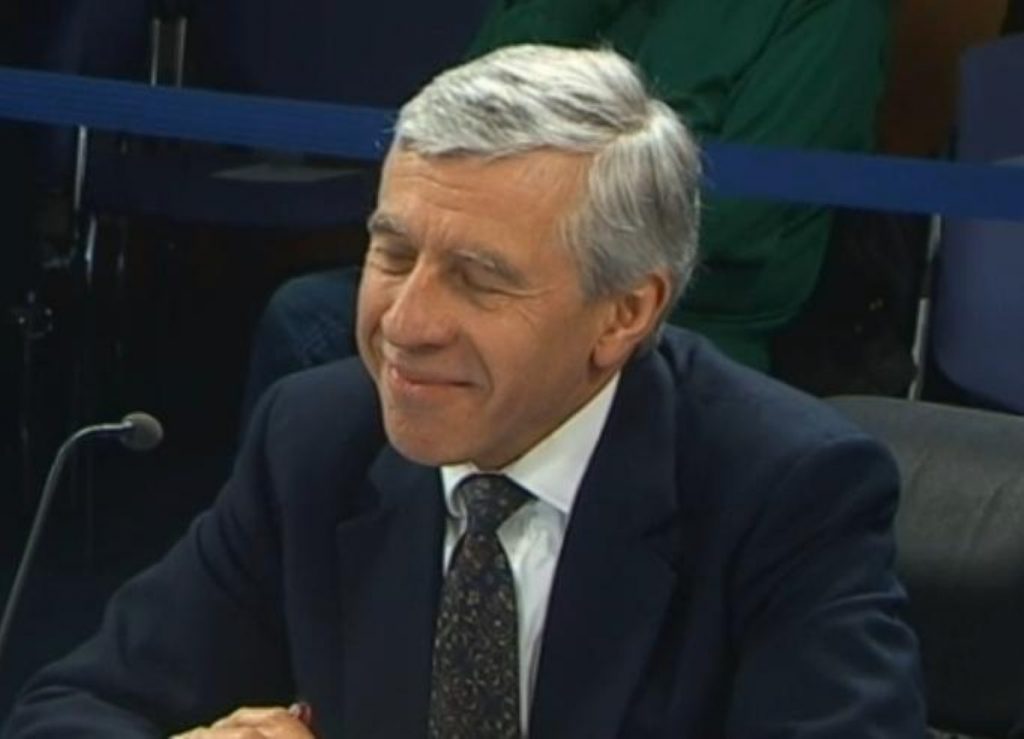Defensive Straw undergoes final Iraq grilling
By Ian Dunt
Jack Straw has faced questions about the decision-making that led to the Iraq war, in the Chilcot Inquiry’s final public hearing.
The former foreign secretary, who was one of the longest-running Cabinet secretaries of New Labour’s tenure, cut a nervy and hesitant figure as he appeared at the inquiry for a second time.
Mr Straw talked openly about his disagreements with Tony Blair during the build-up to the 2003 invasion which ousted Saddam Hussein from power.


“I guess it’s true there was a difference of emphasis between the prime minister, who was further out on the issue of what was most desirable, compared with me,” he told the inquiry.
“I was never on the same page as Vice-President [Dick] Cheney. We had a sort of accommodation.”
Mr Straw said some members of the US government had a “gleam in their eye” when discussing Iraq, suggesting they were keen for a confrontation.
But he did not consider President Bush one of those people.
“My experience of President Bush was that, in the end, when faced with decisions, he was much more thoughtful than he was often credited for,” Mr Straw said.
The former foreign secretary did criticise President Bush’s ‘axis of evil’ speech, however, which he said undermined efforts by Iran’s president to reach out to the West.
“I could sense the game change that his statement led to,” Mr Straw said.
When asked why he had written “very perceptive” in the margin of an MI6 document raising the prospect of a regime change policy towards Iraq, Mr Straw became visibly irritated, insisting that he had not been told the issue would come up.
Cabinet secretaries commonly wrote up several quick-fire judgements in the margins of documents “late at night”, Mr Straw continued.
He said the comments meant the section in question was “perceptive” and worth showing to No 10 but did not necessarily imply an endorsement.
Mr Straw insisted that regime change was never a UK policy because it was “palpably illegal”.
“You could have the wish and desire to see regime change and within clear limits wanted to encourage that. But it could not be and was not an objective of British government policy,” he said.
Asked about the level of Cabinet discussion which took place at the time, Mr Straw admitted that there was “great anxiety about the intentions of the Bush administration” around the Cabinet table.
“The anxiety was, had the prime minister – who was slightly less left wing than most members of the Cabinet shall we say – had he decided himself to take a different view from the prevailing sentiment in the Cabinet,” Mr Straw continued.
The long-serving Cabinet secretary openly discussed his annoyance with the informal ‘sofa- government style which Mr Blair preferred.
“If I had been in [Blair’s] seat, would I have had more formal processes? Yes,” Mr Straw said.
Mr Straw also called for “more carrot than stick” in dealing with Iran – a polar opposite view to that of Tony Blair, who used his appearance to demand a tougher approach to the regime.
The session was the last public hearing for the inquiry, which will now retreat to conduct more research before publishing its recommendations and conclusions.
“It’s going to take some months,” Sir John Chilcot said.
“I don’t want to set an artificial deadline. What I can say is that my colleagues and I want to finish our report as soon as possible.”












